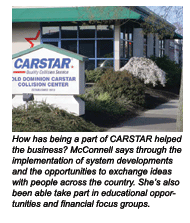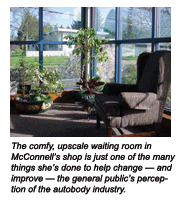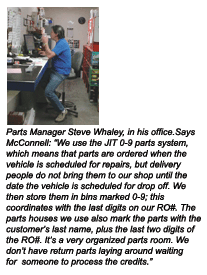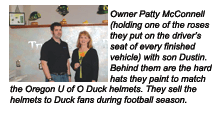 I bought the shop from my ex-husband in 1988 in a divorce proceeding on the steps of the
I bought the shop from my ex-husband in 1988 in a divorce proceeding on the steps of the
courthouse,” says Patty McConnell, owner of Old Dominion CARSTAR Collision Centers. “I was a stay-at-home mom and had just gone back to school to finish my degree. I didn’t know a bumper from a fender when I took over the shop.”
But that didn’t stop her. With the help of her employees, vendors and local auto body association — all willing to offer guidance — McConnell grew a small shop in Springfield, Ore., to a two-store, multi-million-dollar operation.
|
Old Dominion CARSTAR Collision Centers
Location: Eugene and Springfield, Ore. |
If Those Courthouse Steps Had Ears…
You have to wonder why McConnell’s former husband would sell his shop to her. And you’re not alone.
“It’s been 17 years now and I still haven’t figured it out,” she says. “When I first took over, it was pretty traumatic for me. I’d tell the story and at first, it sounded very serious, and then it got to be where it was just funny and people would laugh at it.”
After nearly two decades to mull it over, McConnell has concluded that her ending up with the shop all comes down to one word: alimony.
“The only thing I can figure is he thought he’d have to pay spousal support for the rest of his life, but if he sold me the shop, he wouldn’t have to. He thought I would fail, and then he could buy the shop back.” Or maybe, she adds, “He just didn’t know what he wanted to do.”
Regardless of the reasoning, his attorney called her attorney the day before they went to court and asked if she would like to buy the shop. For some unknown reason, she said, “Yes.”
“To this day, I still don’t know why,” she says. “I was raising three teenage kids by myself and was attending college. I’d gone back to college to get my degree — and I looked at my options and thought, ‘I can either do this, or I can start brand new in something else. It’s all going to be new to me so why don’t I just do this?’ I took it on as a challenge and went from there.”
Now officially a shop owner, McConnell called the appraiser “who was basically running the shop at that time” and asked him if he was willing to stay. He said, “Yes.” She then got the entire staff together at a pizza place (nice move) and asked them if they’d be willing to stay.
They all said, “Yes.”
“We were up and running,” says McConnell. “My very first duty when I took over, other than the bookkeeping, was to check-in parts and I literally didn’t know a bumper from a fender at that point. But I had a wonderful staff — seven employees — and they taught me everything I needed to know.”
That’s not to say the staff wasn’t at all traumatized by the turn of events. Says McConnell: “They were all a little stunned, but they’d watched the [divorce] process over the year. They said they’d do whatever it took to make the shop succeed.
“One thing my ex-husband really established in the community was a reputation for a quality operation. He didn’t know much about customer service, but he did know quality and the whole staff was all quality-minded. They knew that this was still a good place to be and that they could do quality work. They totally supported me.
“I have a really terrific crew, and three of those guys (two technicians and one painter) are still with me — they’ve been with me 21 years.”
Becoming a Sponge
“At that time,” says McConnell, “the Auto Body Craftsmen Association in Oregon was very strong and there was a woman, Janet Cheney, who was very involved in it. She got me involved. I also read every trade magazine, attended NACE, asked questions of everyone and soaked it all up.
“I went out and watched the guys. Believe me, I cannot repair a vehicle. That’s not my job. I’m a huge fan of Henry Ford who said, ‘I don’t have to know how to do it all; I just have to know how to hire the right people.’ And I think I have all the right people.
And McConnell relied on her people in the beginning. A lot. When she took over, the manager at the time, Britt Holmes, showed her the ropes, “didn’t treat me like I was an idiot and answered every question I had.
“My technicians answered questions, my painters, the people who sold me my paint — no one treated me like an idiot. They all treated me with a lot of respect, encouraged me and answered my questions. Nothing was too stupid.”
McConnell’s determination also played a role. Early on, she decided, no matter what, she was not going to fail.
“The one thing I knew was that — it was like a personal challenge — there was no way my ex-husband was going to prove I couldn’t do it,” she says. “I knew I was going to have the best shop in town — bottom line.”
So McConnell put together a vision statement and wrote down her goals every year. Still does.
She met annually with what she calls her “unofficial board of directors” — her attorney and her accountant (and, these days, also her son) — to review the past year, go over goals and set new financial, personal and business goals. “Being really specific about what I want to do is what helped me to succeed,” she says.

Changing the Industry’s Image
“Before I took over the business, I had been to NACE a couple times and to other association meetings — and it was just a bunch of guys with gold chains and big belt buckles with a bunch of girly pictures up in the shop,” says McConnell. “That was my impression of them — just a dirty body shop — yuck! Why would anyone want to spend the entire day at a body shop?
“My biggest goal has been to change the community’s perception of the auto body industry and to make this into a service-oriented industry. That means cleaning up the office, cleaning up the bathroom and marketing to women — because women are over 50 percent of our customers. “We focus on not only a quality product, but also quality service.”
McConnell says they focus on taking care of the customers — who come in the shop distressed, clueless (many have never been in a wreck before) and needing to be taken care of.
“One of our statements over the years has been that, ‘Our business is fixing customers — and, in the process, their car gets repaired impeccably.’ ”
McConnell says that being an outsider to the industry gave her a perspective that most body shop owners probably don’t have — she viewed her shop from the consumer’s point of view.
“The guys still kind of laugh at me because I’ll walk into the shop, and I’ll just be looking at things through the eyes of the consumer — whether it’s how clean the shop is or what the car looks like when it’s in the middle of a teardown — from the front office to the way the paperwork flows.”
How She Grew the Shop
McConnell took an active role marketing the shop. To get started, she visited the University of Oregon’s business department and asked them to help her do a study of who her customers are. Armed with a customer profile, McConnell then put together a marketing plan.
“I think I was one of the first in our area to begin marketing to agents,” she says. “I also started actively marketing to a certain clientele, cleaned up the outside of the shop, put my guys in white uniforms and got some new signage, new business cards, the whole thing.”
McConnell puts together a marketing plan every three years and relies on a combination of radio, TV and newspaper ads, direct-mail pieces and bus backs, which “are huge in this town.” McConnell’s also very involved in different community and civic organizations, which helps to get her shops’ name out there. She also runs a Yellow Pages ad, which she calls “a
necessary evil.”
“We probably get five phone calls a week from people trying to market something, but we don’t waste our time on that,” she says. “We stick to our marketing plan, we stick to our budget and we do it consistently — I don’t believe in going on the air for three months and then not doing it again for two years — that’s a total waste of time.”
And then there was that mysterious visit from CARSTAR Founder Lirel Holt in 1990 that really helped to take the shop to the next level. Holt stopped by to ask McConnell if she was interested in becoming a part of CARSTAR.
“I can’t tell you for sure, but I believe Janet Chaney, who was employed by CARSTAR at that time, suggested he visit our store,” says McConnell. “We talked quite a bit, and I saw the potential to be part of something bigger and better than just a local organization or just trying to do it all by myself out here,” she says. “I went back to CARSTAR and went through their franchise training, and I haven’t looked back. It’s been almost 12 years.”

Deciding on DRPs
These days, McConnell’s shops are on 13 direct-repair programs — “the major ones, some smaller ones, a couple of very small local ones and
several that CARSTAR has put
together nationwide.”
When asked how her shop has benefited from these relationships, she says: “That’s the hardest question you’ve asked. … Definitely our cycle times have improved partly because of just the pressure from the insurance companies. We had to come up with some better systems. We definitely do not have increased profits. I don’t know who says they do — if anyone says they do, I’d love to talk to them. We’re very measurement-oriented, and we measure and monitor all of our profit centers. We’ve got goals for every single profit center and because we track all those profit centers on each job, we know that DRPs do not give us bigger profits.”
On the other hand, says McConnell, “You can’t ignore the insurance industry. They sign the check over 90 percent of the time so you have to figure out how to make a profit and still be a viable resource to the consumer who chooses to go through the DRP system. But we continue to educate the consumer on their options and make our service so invaluable to them that they keep on coming back. We have good relationships with our DRP programs, and we work very hard to maintain a professional demeanor with them at all times. We just have to ‘try harder’ to stay profitable with some programs. This means monitoring all aspects of the job, being on top of any necessary changes to the job and tracking our parts and materials usage.
“We’ve had to come up with better systems, better paper flow, better management of our time — they’re all things that we have to manage better because they’re asking us to do the things that they used to do in their claims centers. We’re now their claims people, and we’re not just doing it for one program; we’re doing it for multiple programs, and all of them have their own systems and requirements. It has made us very efficient.”
Obviously the efficiency is a plus, but beyond that, McConnell isn’t sure if customers like (or even care about) DRPs.
“I think our customers are a little bit ambiguous about that. As long as they get their cars back on time and they’re done right and they aren’t hassled, they’re happy and they don’t really care about the process. There are some who want to know more details, but in general, people just want their cars fixed.”
McConnell’s shop has gotten even more efficient recently with the institution of a lean manufacturing process geared toward streamlining operations. Her technicians had mixed feelings about the change; some left, and some were let go. But she says the ones who’ve stayed are loving the new system. In addition to changing the mindset of employees, McConnell altered the shop by knocking out three walls to create four aisles for a more efficient work flow. The ultimate goal of all this change is to increase production by 30%, and McConnell believes they’re on track to do that.

Time Flies
Eighteen years after that fateful day at the courthouse, McConnell is still minding the store — along with her son, Dustin, who now owns 8 percent of the
business.
“He’s 31 now, and he was six months old when we opened the business,” she says. “It’s been his whole life.”
Dustin is the production manager/ general manager for both locations, and he’s also back in school getting his business degree, as per his and his mother’s agreement: She’ll sell him the shop in four years if he completes his degree.
So what’s McConnell’s role these days?
“I’m whatever,” she says. “I just cleaned the men’s toilet this morning so I’m the all-purpose employee.”
But don’t let McConnell’s modesty fool you. There’s more to her than meets the eye — or she wouldn’t have made it this far.
“I’ve never regretted taking on this challenge, but I have definitely had sleepless nights throughout the years,” she says. “Aside from the first few months, the most difficult time for me was when we moved our location to a larger facility and took on additional overhead, and then again in 1996 when we remodeled that location and I lost my production manager and fired my parts manager all at the same time.
“We were working out of a 12-foot trailer, adding a paint facility, remodeling the offices and doing record sales. My son was writing estimates, I was running production and the remodel process, and my daughter was doing the books. I would arrive at 6 in the morning and have to literally climb into the back door of the trailer because we had to remove the stairs at night to keep transients out of the building.
“I would finish my day late at night and head home exhausted, telling myself, ‘You are a successful, accomplished and talented woman full of grace and joy.’ That was my prayer and mantra. And it’s still posted above my computer along with the scripture, ‘She is clothed with strength and dignity. She can laugh at the days to come.’ ”
In addition to her resolve, McConnell credits her “eyes wide open” attitude with helping her to succeed and to continue to get better at what she does.
“Every day I learn something new in this industry,” she says. “I think that’s something that helps to make a person successful — if they’re always aware that they’re just beginning. Whatever you’re doing in life, if you look at it like you’re a beginner with eyes wide open, you’ll take in information around you and never stop learning. That’s the only way you’re going to succeed, and that’s what I did.”
Writer Georgina K. Carson is editor of BodyShop Business.
| > Behind the Bays Scheduling system: CR Auto Scheduler Estimating system: CCC Management system: Mitchell ABS Estimate scrubber: CARSTAR’s Nugen. “Managing DRPs is difficult because each one is different,” says McConnell. “When you’ve got 13 programs, it’s hard for an appraiser to keep up on it. You go in and enter all the different programs as profiles, write your estimate, it goes through Nugen and it does what’s called scrubbing them — it lets you know whether or not you’re out of line, or whether you can charge more for a certain thing. It’s like having your own little bookkeeper telling you what you can and can’t do on each estimate.” Prep station: Garmat, in Eugene shop Spraybooth: Garmat (downdraft) in Eugene shop, Devilbiss crossdraft in Springfield shop Lifts: Western Hoist 2000 Computerized measuring system: 3 Chief Velocity (Genesis), 2 in Eugene, 1 in Springfield Welders: ProSpot PR-10, ProSpot PR2000, 3 Lincoln arc welders and 2 Hobart MIG welders Paint: BASF Future equipment purchases: another spraybooth |
| On how scared she was taking over the shop: “On a scale of one to 10, an 11!” says McConnell. “I have two really wonderful parents. My dad was a pastor, and I was raised with this spirit of taking on a challenge. You always complete what you start and never quit. My folks were always really encouraging of me, and my dad told me that I could do whatever I set my mind to doing — and I guess I just believed.” On that little something extra: “We put a gift in every singe vehicle — a live rose in every car. To this day when customers send us little ‘thank you’ notes … one of the things they always comment on is that rose.” On giving concessions on DRPs: “I prefer not to talk about them partly because I don’t want any other insurance company to get ideas. I can say that each one of them is different. We have to be competitive in our market area, and with the programs that CARSTAR has helped put together for us, we definitely don’t want to be discount driven.” On those in the industry who claim DRP shops can’t do quality work: “There is one DRP critic I can think of in this neck of the woods, and if you look at the quality of work that comes out of his shop and at his reputation in the community, they stink. It’s bad. I know we’re considered the premium shop in our community and not just because of the quality of work but because of our ethics, our integrity and our customer service — and none of that has suffered because of our DRP work. They know that we’ll still maintain the same level of quality and service — and that’s why we haven’t been accepted by a couple of the programs.” On insurers steering work: “Some do, and there’s one that definitely does steer work away from us. We’ve just chosen to consider the source, move on and not let it spoil our party. The programs that we’re on, the claims offices do make recommendations, but I look at it like this: Why wouldn’t they want to bring their car here? We have a great reputation. We do quality work. Why would they want to take it anywhere else? If they take it somewhere else, it’s their loss.” |













